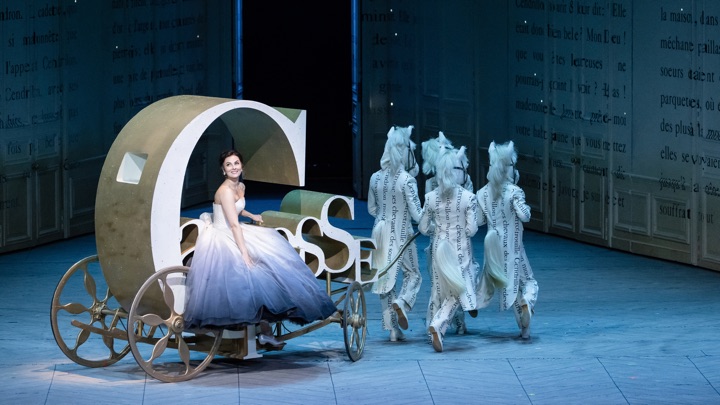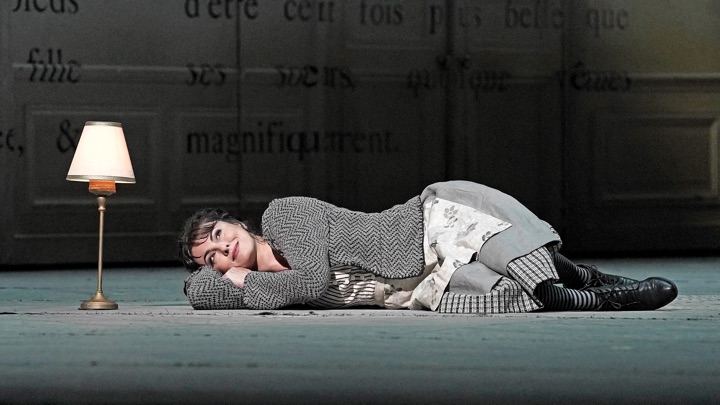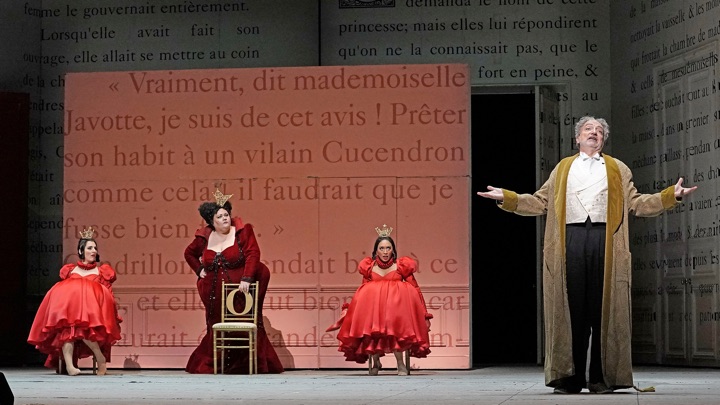

A mostly able cast skillfully put across a new and appealing English translation by Kelley Rourke, and a good time seemed to be had by all though I don’t recall seeing a single child in attendance.
Laurent Pelly’s much-traveled production of Massenet’s enchanting Cendrillon finally arrived at the Met in 2018 but, for me, it was DOA as its romantic leads—Joyce Di Donato and Alice Coote—were consistently stressed by their roles’s high tessitura. In addition, Pelly’s busy, cartoonish direction did a real disservice to the work’s magical spell. On Friday there was still lots of prancing about and wild exaggeration, but the swift pace of the abbreviated running time somehow made it less annoying. Perhaps, Pelly who returned to direct, had toned it all down a bit.
Like the Met’s similarly broad staging of Rossini’s La Cenerentola, the heroine’s two sisters, here named Naomie and Dorothy, are presented as simpering idiots. Jacqueline Nichols and Maya Lahyani soldiered on with commendable energy even when they were inexplicably cursed to wear the same garish red dress to the Prince’s ball. Stephanie Blythe returned to her outrageously over-the-top interpretation of their mother, Mme de la Haltière, but one wished, that for all its broad entertainment value, it had been better, more carefully sung.
Laurent Naouri too was once again Pandolfe, Cinderella’s long-suffering father. The cast’s lone non-native English speaker, the French bass-baritone contributed the evening’s most consistently clear diction. His slow-boiling exasperation was more amusing than his wife’s obstreperous bullying, and his tenderly nostalgic duet with his daughter was the opera’s most touching moment.
The score’s high point, a rapturous forest encounter between Cinderella and her Prince Charming overseen by the Fairy Godmother, was omitted entirely in this edition. While I was dismayed by this grievous cut, I did remember how disappointing Pelly’s staging had been. But I understand that the scene isn’t absolutely essential to the arc of the fairy tale. So, I reluctantly forgave anonymous person or persons who concocted the Met’s abridgement.
The cutting of that love duet, however, had the surely unintended effect of deemphasizing Cinderella and the Prince and permitted Pandolfe and Mme de la Haltière to dominate the action far more than they should. Therefore, despite their best efforts, Isabel Leonard and Emily D’Angelo’s mopey lovers became subordinates in their own story.
Cinderella was my first in-house experience with Leonard since her inadequate Mélisande nearly three years ago.
Massenet’s melancholy waif suited her sympathetic personality much better, the voice sounding blooming, healthy and rested. Her mezzo has always sounded rather soprano-y, so it was no surprise that she, as well as D’Angelo, were consistently more comfortable than their predecessors had been in roles composed for sopranos.
The Canadian mezzo has become dizzyingly busy since winning Operalia and leaving the Met’s Lindemann Young Artist Development Program. According to her program bio, in addition to Massenet, this season alone sees appearances in operas by Monteverdi, Rossini, Mozart, Handel, Gounod and Gluck! While her ardent Prince betrayed some dusky rawness on high, D’Angelo’s intensity drew one in. and one hopes that this interestingly intense singer will be around for a long while.
I hadn’t heard Jessica Pratt, Cinderella’s Fairy Godmother, since 2012 when she was fought over by Ewa Podles and Michael Spyres in Rossini’s Ciro in Babilonia at the Caramoor Festival. Since that dazzling Amira, the English soprano has become one of the world’s leading bel canto specialists, and a pair of Lucias at the Met in 2018 received warm hosannas.
Though the Fairy Godmother loses most of her music by the Met’s abridgement, I wasn’t sorry as Pratt’s wiry high notes and squally trills made me flinch. Though I would have loved hearing Leonard and D’Angelo soar in the forest love scene, I minded its absence less given Pratt’s poor form. One hopes this was just an off night!
Cendrillon might be, with Werther, my favorite Massenet opera, and Emmanuel Villaume’s buoyant, sympathetic conducting made it vividly come alive. I would welcome Leonard, D’Angelo and Naouri under Villaume in a revival of the complete score in French. But in the meantime, the Met will offer three new principals when Julie Boulianne, Samantha Hankey and Brandie Sutton take over the kingdom on Wednesday, and I’ll be listening to Met’s free stream.
Photos: Karen Almond / Met Opera



























Comments